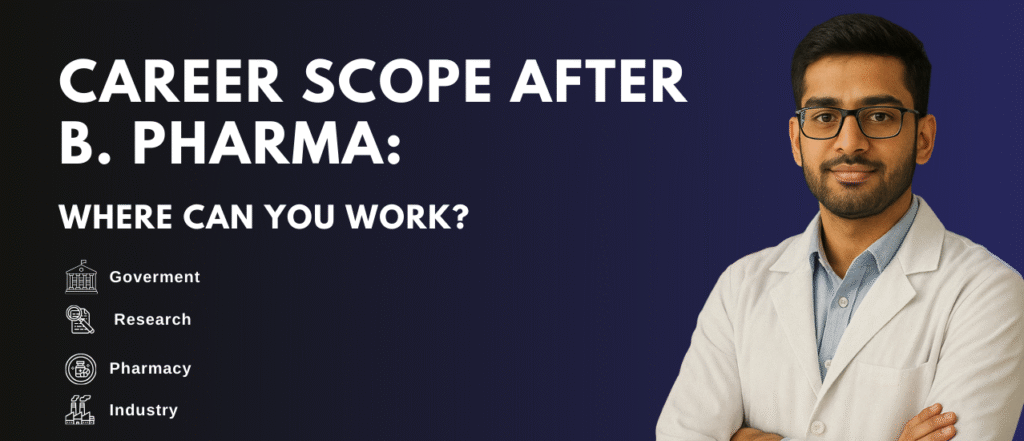Have you ever been fascinated by how a simple pill can fight a disease? Or wondered about the science behind the medicines that heal us? If you have a keen interest in biology, chemistry, and a desire to be on the frontlines of healthcare, then the question “What is B. Pharma?” might be the key to unlocking your future.
Welcome to your first consultation. Think of this not just as an article, but as a guiding session to help you understand one of the most stable and rewarding career paths in the medical field. A Bachelor of Pharmacy, commonly known as B. Pharm, is more than just a degree; it’s a gateway to a profession dedicated to the art and science of preparing and dispensing drugs, and ensuring the safe and effective use of medication.
In this detailed guide, we will walk you through every crucial aspect of the B. Pharma degree—from its core purpose and subjects to the vast career opportunities it presents. Let’s begin this journey together.

What is B. Pharma? Defining the Degree
At its heart, B. Pharma is an undergraduate professional degree program in the field of Pharmacy. It is typically a 4-year program (divided into 8 semesters) that equips students with the knowledge and skills required to understand the composition, properties, and therapeutic uses of medicines.
The program is designed to blend theoretical knowledge with practical laboratory experience, ensuring graduates are ready to contribute to the pharmaceutical industry, healthcare systems, and research institutions from day one.
The Main Goal of a B. Pharma Program
The primary objective of the B. Pharma curriculum is multifaceted. Its main goals are to:
- Create Competent Pharmacists: To produce skilled professionals who can expertly prepare, compound, and dispense medications as per prescriptions from healthcare providers.
- Ensure Drug Safety and Efficacy: To teach students how to assess the quality of drugs, understand their side effects, and guide patients on their correct usage to maximize benefits and minimize risks.
- Bridge the Gap between Medicine and Patient: Pharmacists are the most accessible healthcare professionals. This degree trains individuals to be a vital link between doctors and patients, providing crucial advice on over-the-counter medications, lifestyle changes, and disease management.
- Fuel Innovation in Drug Discovery: To lay a strong foundation for research and development (R&D), enabling graduates to contribute to the creation of new, more effective drugs for various ailments.
Why Choose a Career in Pharmacy? The Compelling Advantages
Pursuing a B. Pharma is a strategic decision for a fulfilling career. Here’s why our counseling team often highlights this path:
- High Demand & Job Security: The healthcare and pharmaceutical sectors are ever-growing. The need for qualified pharmacists in hospitals, retail, and industry is constant and recession-resistant.
- Diverse Career Opportunities: A B. Pharma degree does not limit you to one role. The scope is immense, spanning clinical research, regulatory affairs, sales, marketing, production, and more.
- Respected Profession: Pharmacists consistently rank among the most trusted professionals. You gain the respect of your community by playing a direct role in patient care and well-being.
- Financial Stability: Pharmacy offers attractive salary packages and excellent growth potential, making it a financially rewarding choice.
- A Chance to Make a Real Difference: Every day, you have the opportunity to help people feel better, manage chronic conditions, and lead healthier lives. It’s a career with profound purpose
What Will You Learn? Key Subjects in the B. Pharma Curriculum
The B. Pharma syllabus is meticulously crafted to cover all aspects of pharmaceutical science. Here’s a breakdown of the core topics you will encounter:
Core Pharmaceutical Sciences
- Pharmaceutics: The science of dosage form design. You learn how to turn a active drug substance into a usable medicine like a tablet, capsule, or injection.
- Pharmacology: The study of how drugs interact with living systems. This includes understanding the mechanism of action, therapeutic effects, and side effects.
- Pharmaceutical Chemistry: Involves the design and synthesis of new drug molecules, along with analyzing their chemical properties and quality control.
- Pharmacognosy: The study of medicines derived from natural sources, such as plants, herbs, and microorganisms.
- Pharmaceutical Analysis: The set of processes used to identify, quantify, and purify a substance, ensuring the drug is pure, effective, and safe for consumption.
Applied and Medical Subjects
- Anatomy, Physiology, and Pathophysiology: Understanding the human body, its normal functions, and the changes that occur during disease is crucial for understanding drug therapy.
- Hospital & Clinical Pharmacy: Focuses on the role of a pharmacist in a hospital setting, including managing pharmacy operations, drug information services, and patient counseling.
- Biochemistry & Microbiology: Provides knowledge about chemical processes within living organisms and the microorganisms that antibiotics and other drugs are designed to combat.
The program also includes mandatory practical lab sessions and industry training/internships to provide hands-on experience.
Eligibility Criteria: Who Can Pursue B. Pharma?
To be eligible for admission into a B. Pharma program in India, a candidate must typically fulfill the following criteria:
- Have passed 10+2 (or equivalent) from a recognized board.
- Have studied Physics, Chemistry, and Biology/Mathematics (PCB/PCM) as core subjects.
- Secured a minimum aggregate score (usually between 45% to 50%, varying by university and category).
- Qualify for state or national-level entrance exams like GPAT, NEET (for some states), or university-specific tests.
The Vast Career Scope After B. Pharma: Where Can You Work?
This is where the B. Pharma degree truly shines. Your options are not limited to a single domain. You can build a career in:
1. Community Pharmacy (Retail Pharmacist)
- The most visible role, managing a retail pharmacy, dispensing prescriptions, and advising the public on minor ailments and health products.
2. Hospital Pharmacy
- Working within a hospital, you would be responsible for managing the drug distribution system, preparing sterile formulations (like IV fluids), advising doctors on drug selection and dosage, and directly counseling in-patients.
3. Pharmaceutical Industry (The Corporate Pathway)
- Production & Manufacturing: Overseeing the large-scale manufacturing of drugs.
- Quality Control & Assurance (QC/QA): Ensuring every batch of medicine produced meets strict quality standards.
- Research & Development (R&D): Working on formulating new drugs, improving existing ones, and conducting clinical trials.
- Regulatory Affairs: Ensuring the company complies with all laws and regulations set by bodies like the FDA.
- Sales & Marketing (Medical Representative): Promoting and selling pharmaceutical products to doctors and hospitals.
4. Higher Studies and Research
- A B. Pharma degree is the first step toward advanced degrees like M. Pharma (Master of Pharmacy), MBA (in Pharmaceutical Management), or a Ph.D. for those interested in deep research and academia.
5. Government Sectors
- Opportunities exist in government hospitals, drug control departments, armed forces, and public sector pharmaceutical companies.
B. Pharma vs. D. Pharma: Understanding the Difference
A common point of confusion we address in our counseling sessions is the difference between B. Pharma (Bachelor) and D. Pharma (Diploma in Pharmacy).
| Feature | B. Pharma (Bachelor of Pharmacy) | D. Pharma (Diploma in Pharmacy) |
|---|---|---|
| Level | Undergraduate Degree (4 years) | Diploma (2 years) |
| Depth of Knowledge | Extensive, covering theory, research, and development | Focused on the basics of pharmacy practice and dispensing |
| Career Opportunities | Wider scope (R&D, Production, Management, etc.) | Primarily focused on retail and hospital dispensing |
| Higher Education | Direct eligibility for M. Pharma and Ph.D. | Requires a bridge course to enroll in B. Pharma |
| Starting Salary | Generally Higher | Comparatively Lower |
Is B. Pharma the Right Fit for You? A Counselor’s Final Advice
Choosing your educational path is one of the most important decisions you will make. The B. Pharma program is ideal for you if:
- You have a strong aptitude for Science, particularly Chemistry and Biology.
- You are detail-oriented, analytical, and have a methodical approach to work.
- You possess good communication skills and enjoy interacting with and helping people.
- You are looking for a respectable, stable, and diverse career in the healthcare sector.
If this sounds like you, then the Bachelor of Pharmacy could be the perfect launchpad for your professional life.
Your Call to Action: Shape Your Future in Healthcare
The world of pharmacy is dynamic, challenging, and incredibly rewarding. Understanding what B. Pharma is is just the first step. The next step is to take action.
Are you ready to explore if B. Pharma aligns with your academic strengths and career aspirations?
Our expert counselors are here to provide personalized guidance tailored to your unique profile. We can help you with:
- In-depth Career Counseling for the pharmaceutical field.
- Choosing the Right University that fits your goals.
- Understanding the Admission Process and entrance exams.
